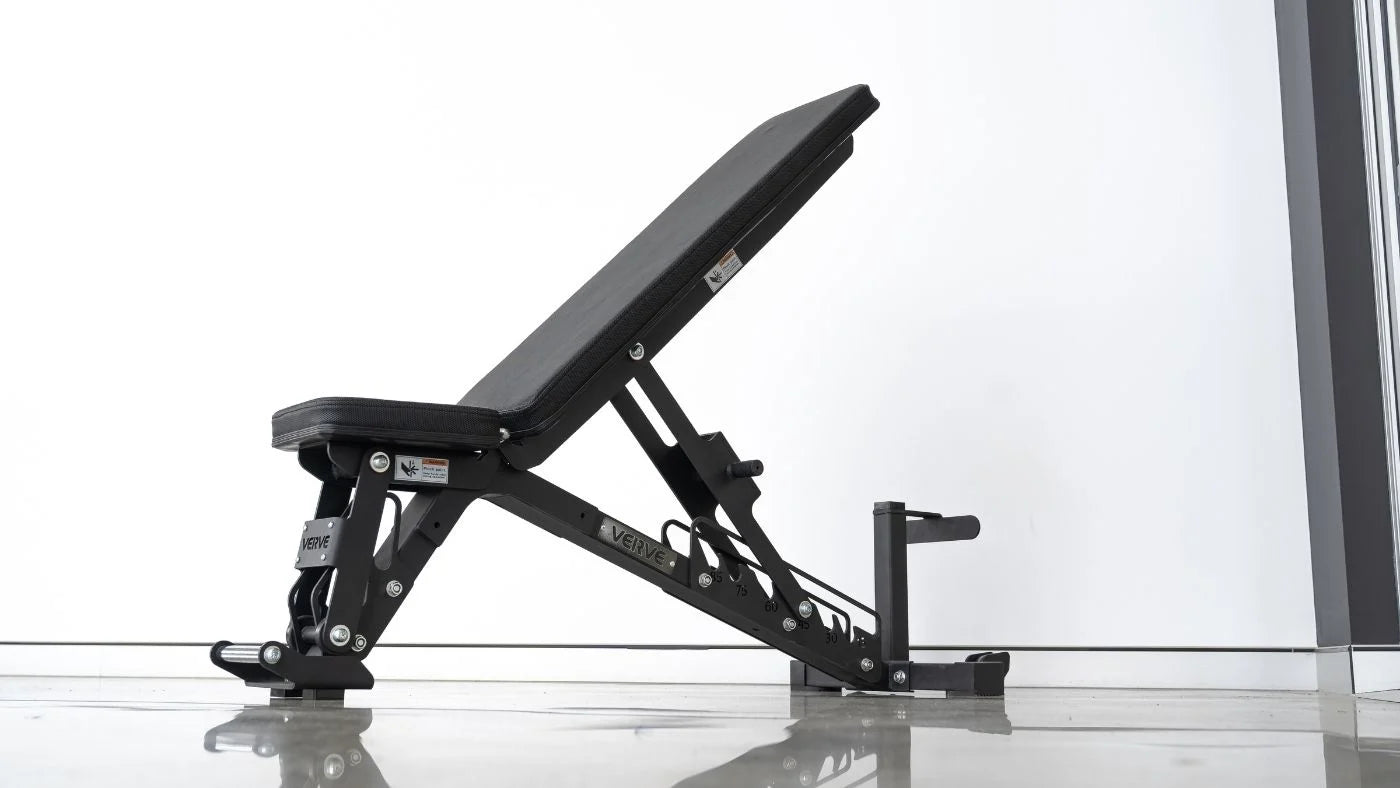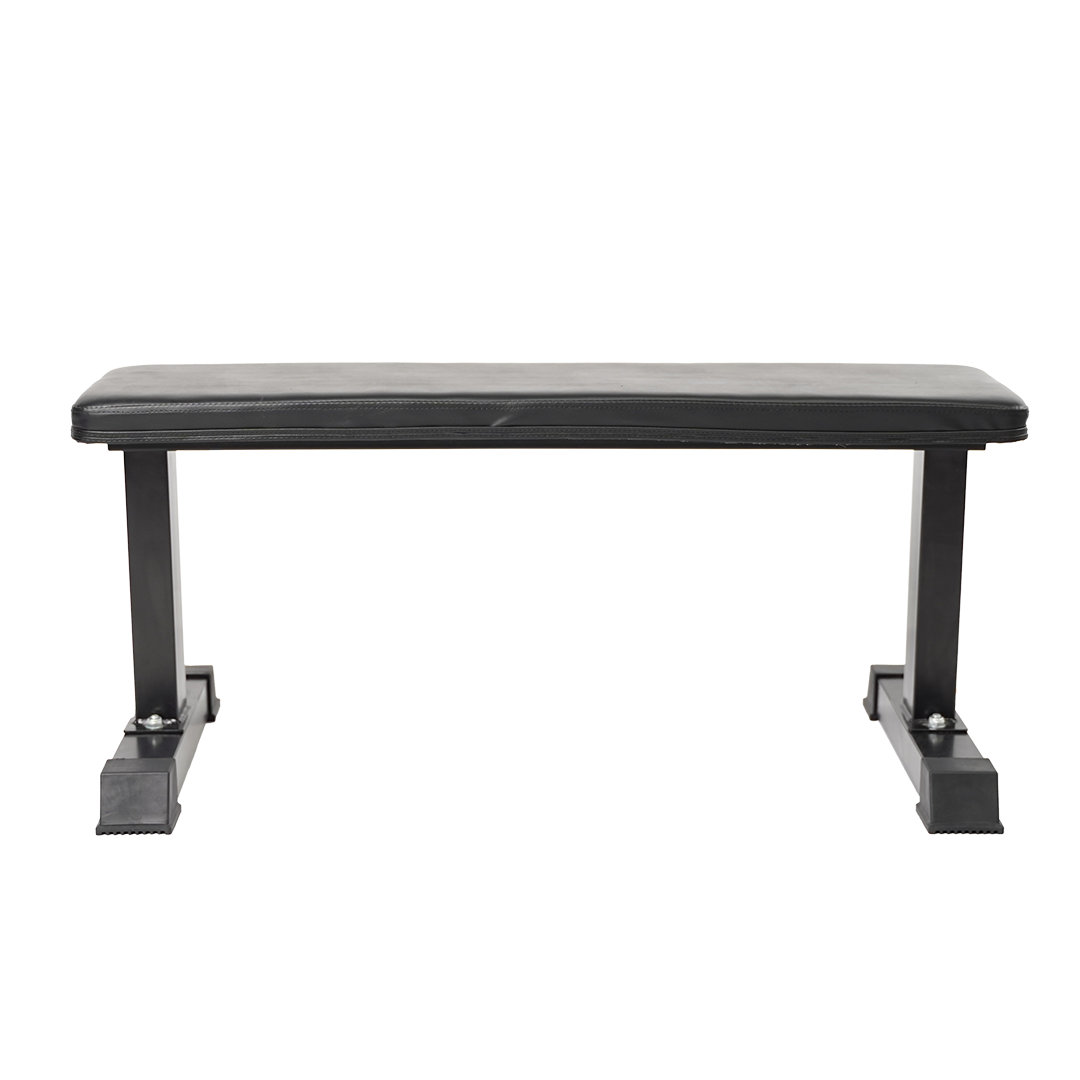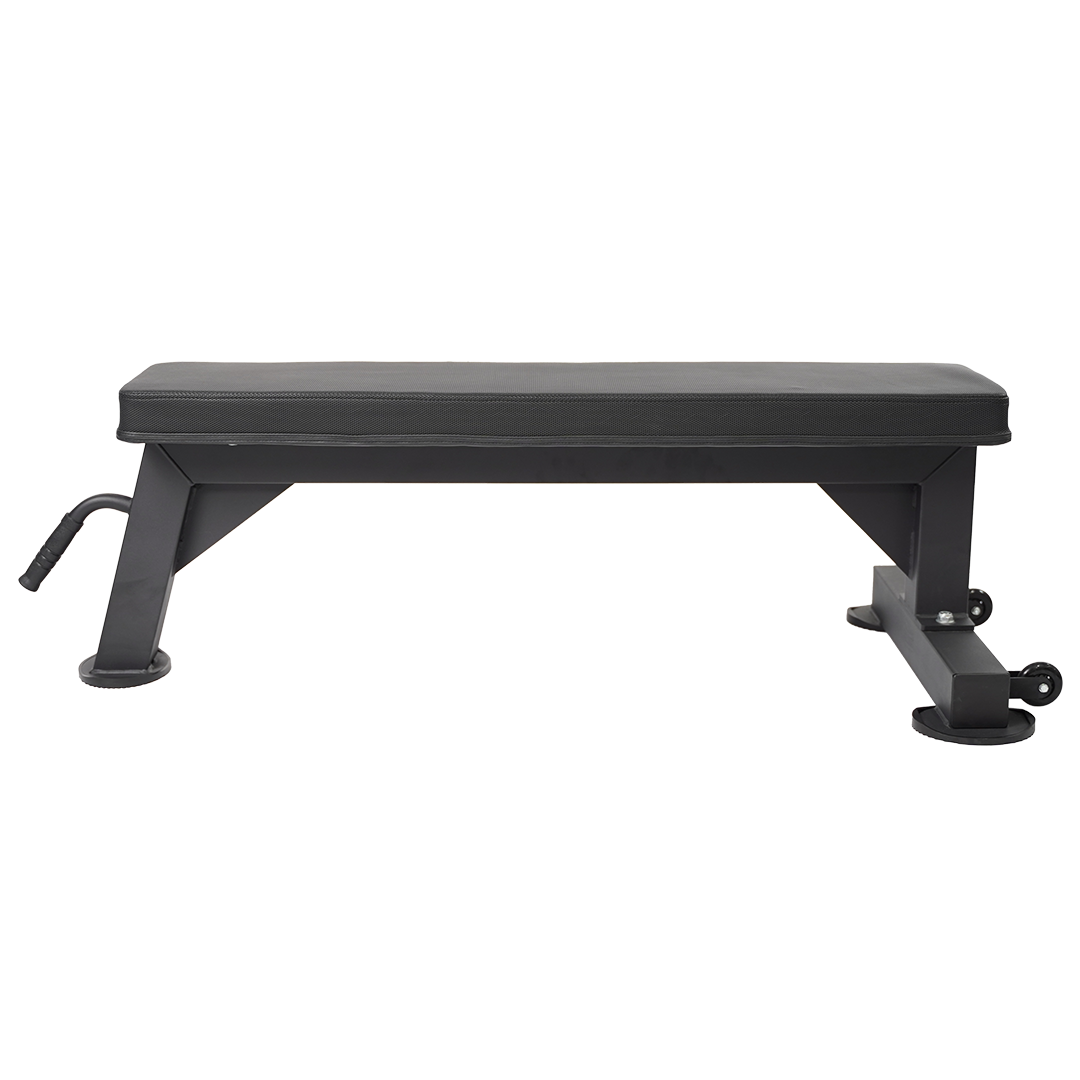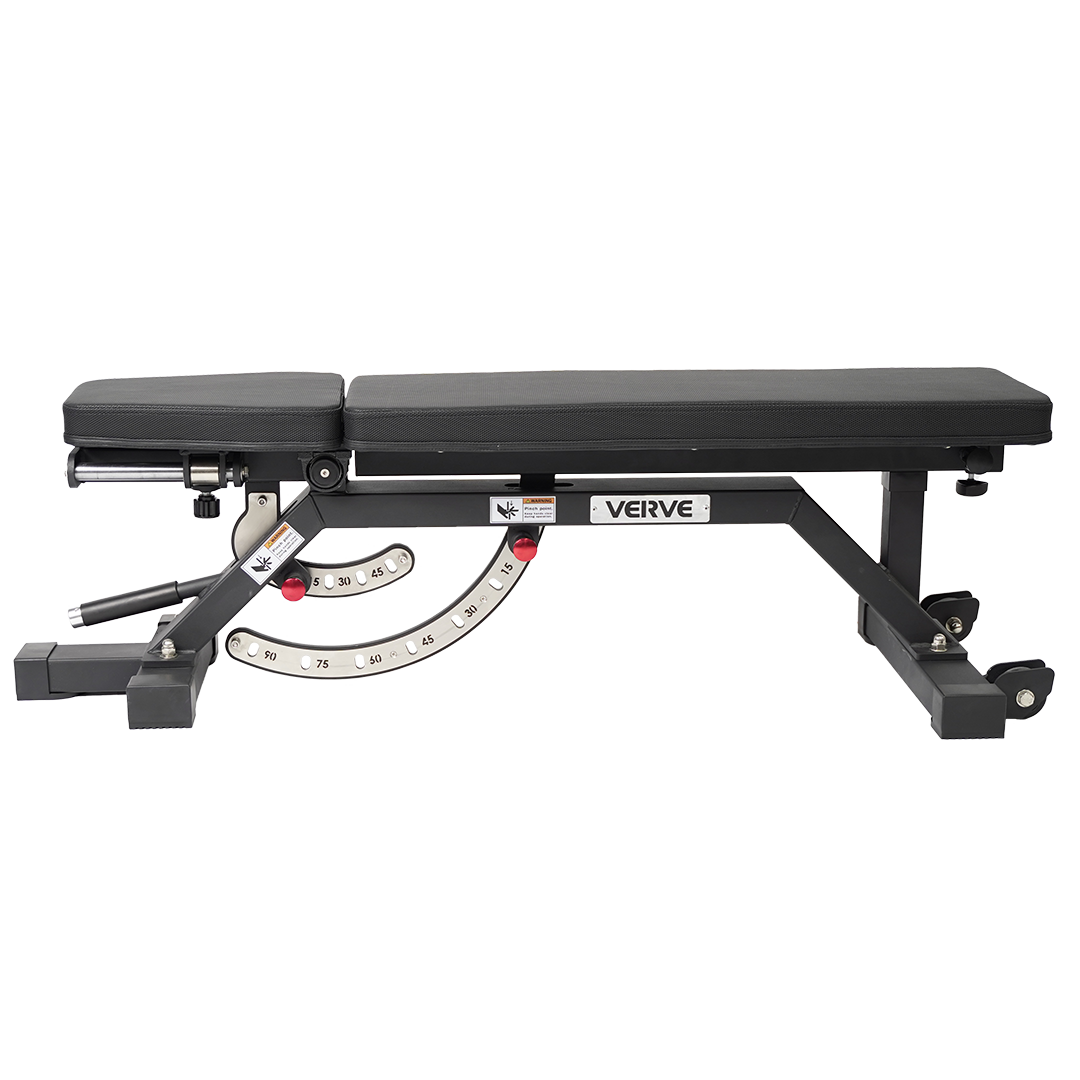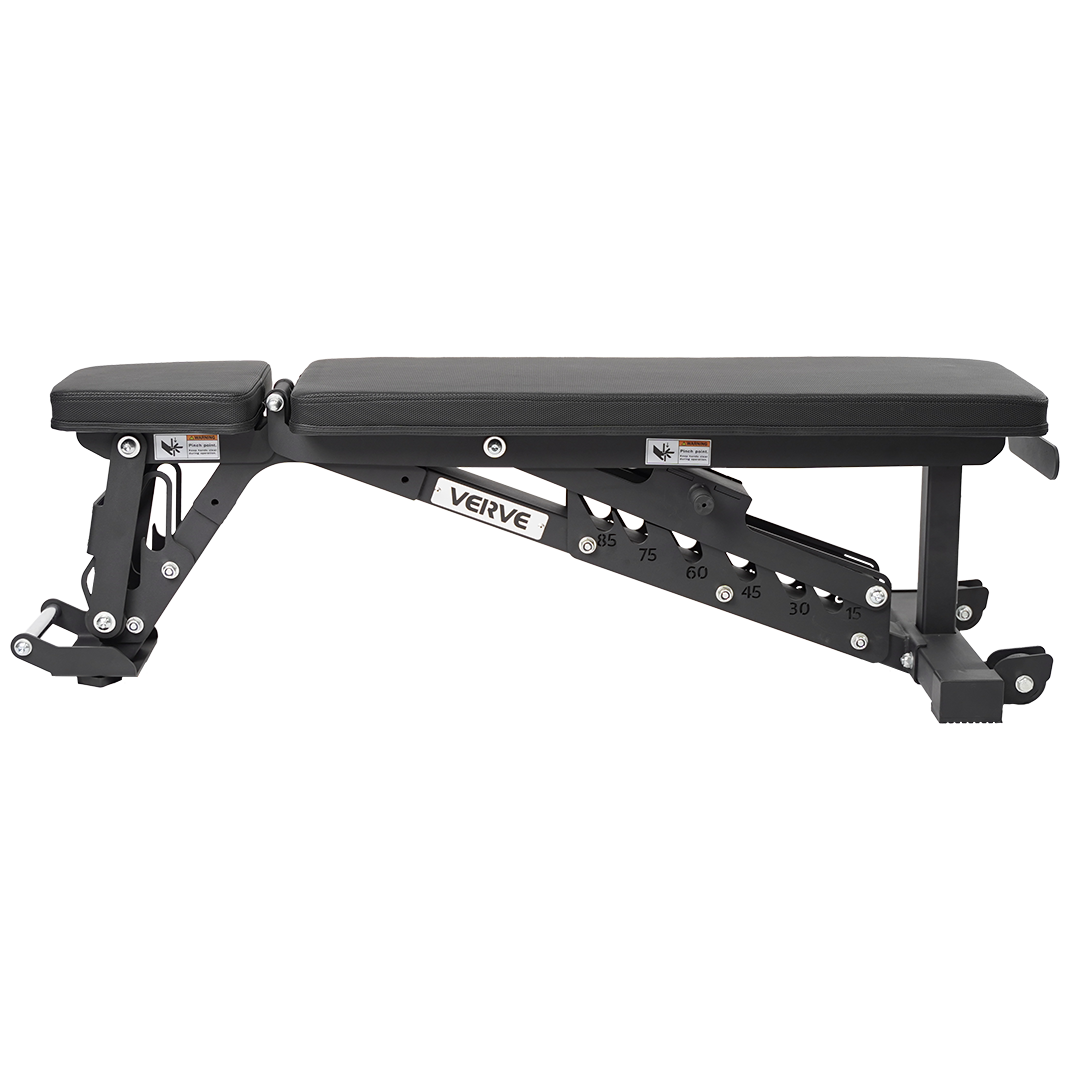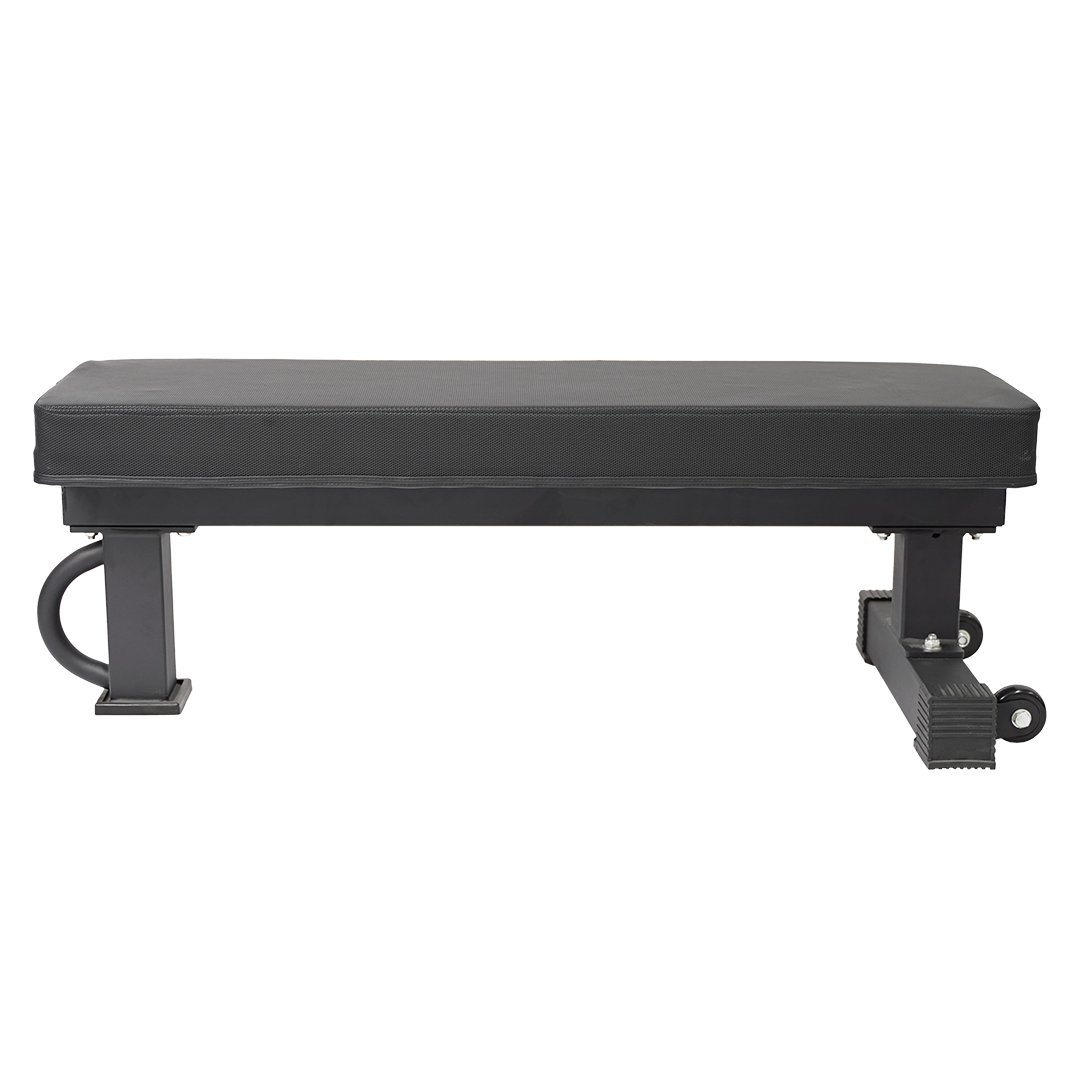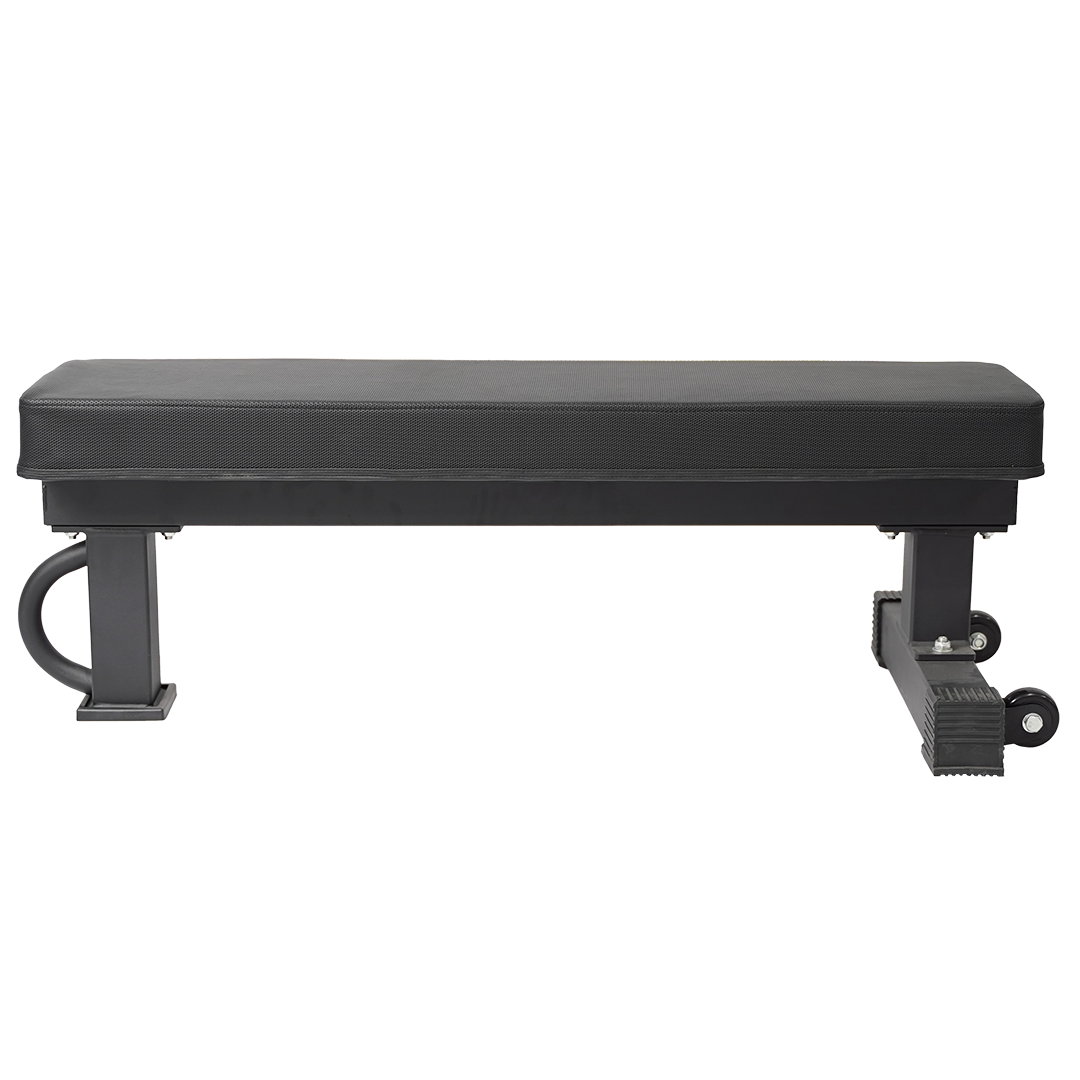Are you familiar with weight benches? These versatile exercise equipment pieces are designed to offer a stable platform for strength training exercises, making them an excellent addition to your workout routine.
What's great about weight benches is their compatibility with various workout equipment, such as free weights like barbells and dumbbells, as well as machines, allowing you to diversify your training regime. You can also customise the height and angle of the bench to fit various body types and exercise routines, making it suitable for both beginners and advanced lifters.
By incorporating a weight bench into your exercise routine, you can increase your strength training potential and work towards achieving your fitness goals.
A good weight bench can make your workout much more effective and enjoyable. In contrast, the wrong bench could make your workout uncomfortable, frustrating, and even dangerous.
With so many different types of benches to choose from, it can be a hard task to decide which one is right for you. This guide will help you choose the right weight bench for your needs.
Benefits of Using Weight Bench
Weight benches are a fantastic addition to any strength training regimen, and here's why.
- Targeted Workouts: You can perform highly effective exercises that target specific muscle groups in a way that other equipment simply cannot match. Not only that, but you can customise the angle of your body to better target your desired muscle group, giving you greater control over your workout.
- Increased Safety: Weight benches provide excellent stability and reduce the risk of injury during exercise. They create a stable platform that evenly distributes pressure and force throughout your body, protecting your joints from unnecessary strain. This feature is especially beneficial for those with pre-existing injuries or joint pain.
- Versatility: Weight benches are also ideal for other exercises, such as sit-ups and crunches, or any abdominal workout that requires support for your back and shoulders.
If you're considering purchasing a weight bench, we highly recommend reading through this informative blog, as it offers valuable insights into buying the right bench for your specific needs.
Types of Weight Benches
When it comes to weight benches, there are numerous options to choose from, and selecting the right one can be daunting, but don't worry - we're here to assist.
Broadly speaking, there are four types of weight benches, each one offering advantages and disadvantages.
- Flat benches
- Adjustable (FID) benches
- Olympic benches
- Speciality benches
So, what makes them different from one another?
1. Flat benches
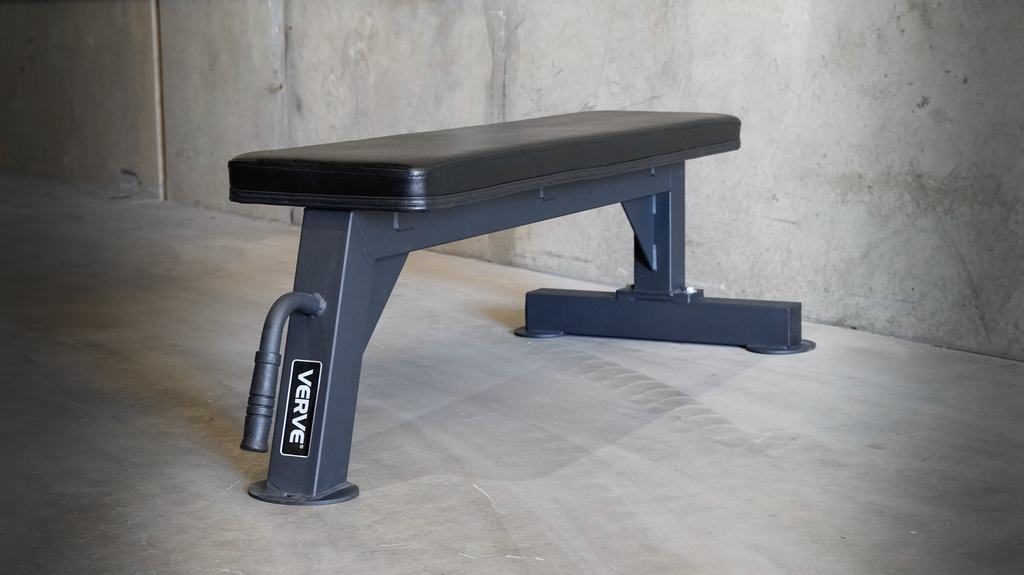
Flat benches are great for providing a solid platform for all sorts of barbell and dumbbell exercises, as well as bodyweight exercises like bench dips or rear-foot elevated split squats.
Because they're not adjustable, they tend to be super strong and can support a lot of weight - which makes them ideal for commercial settings. Their simple but solid construction means that there is very little that can go wrong with a flat bench, so they should be hardwearing and long-lasting. Plus, they're usually cheaper than other types of benches, so gyms tend to have a few of them lying around.
One downside to using a flat bench is that you can't adjust the exercise angles. So, for example, you can only do horizontal dumbbell presses and flys. And if you're doing exercises like biceps curls or shoulder presses, you'll have to do them without the luxury of back support.
But overall, flat benches are hardwearing, long-lasting, and easy to move around - so they're a great choice for smaller spaces or multi-purpose areas.
Pros:
- Flat benches are really strong and stable, which makes them great for heavy lifting.
- They're also really easy to move around - perfect for when you need to switch up your workout space.
- Flat benches can be used in a ton of different ways - you can stick 'em in a Smith machine, power rack, or cable machine to mix things up.
- They're super hardwearing and long-lasting, which is great if you're looking for a bench that'll go the distance.
- Flat benches are pretty versatile - you can use them for all sorts of exercises.
- They're usually quite compact, which makes them a great option for small spaces.
- They're usually cheaper than other types of benches, which is always a plus.
Cons:
- The downside to flat benches is that they're not adjustable, so they're really only suitable for supine exercises.
- For safety reasons, most barbell exercises should be done in conjunction with a power rack.
- If you're doing seated exercises, there's no back support - so you'll need to be careful and make sure you're using proper form.
2. Adjustable (FID) benches
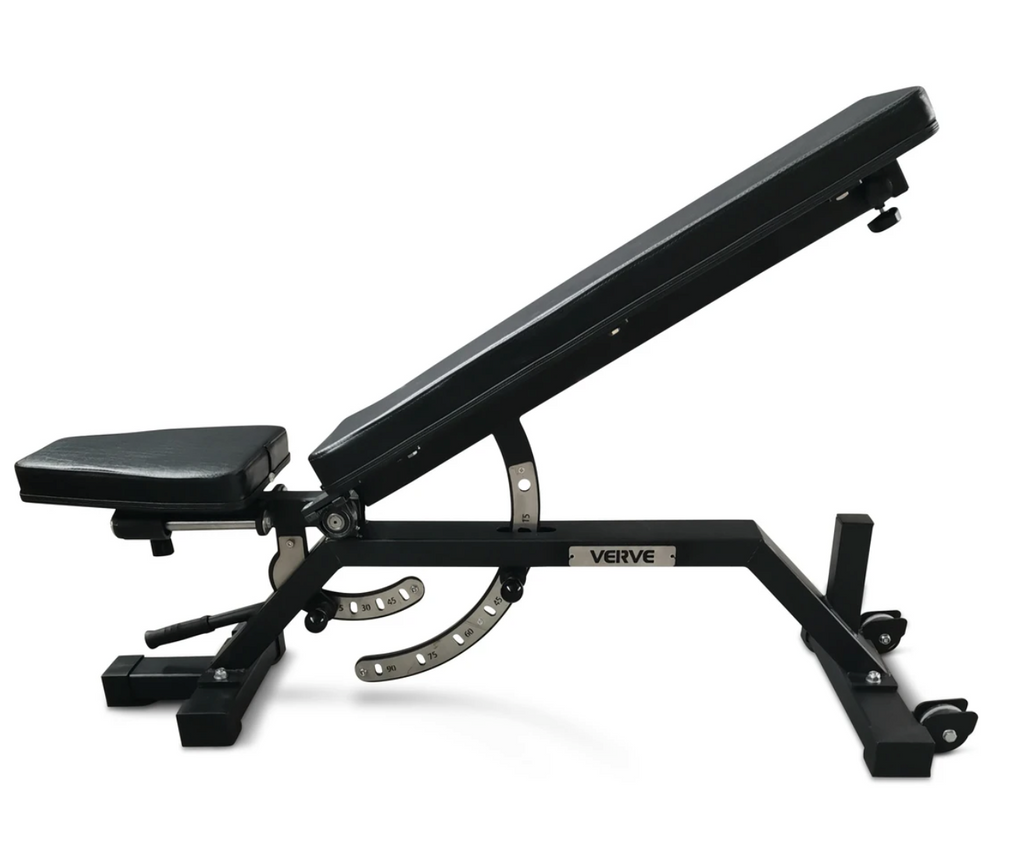
Adjustable benches are sometimes called FID benches because they can be set to flat, incline, or decline positions. This is great because you can target different muscles from different angles.
You can set the bench to a slight incline for a different kind of bench press, or to a steep incline for shoulder presses. With an adjustable bench, you can also do chest-supported rows and reverse flyes.
Unlike flat benches, adjustable benches have moving parts that can wear out over time. That said, good quality FID benches should last a long time with proper care.
It's a good idea to check them regularly for any signs of wear and tear, especially with more frequent use. One thing to keep in mind is that adjustable benches are not as strong as fixed flat benches, and they tend to be heavier and larger too.
However, to make them easier to move around, many adjustable benches come with wheels so you can roll them around to different spots in your home or commercial gym.
It's also worth noting that not all adjustable benches offer a decline setting, and those that do usually only provide a slight decline. So, if you want to do decline exercises, you might need to look for a specialised decline bench.
Finally, adjustable benches with more moving parts may wobble a little, but good quality ones should wobble much less than lightweight home-use benches. Just make sure the incline locking mechanism is in good working order and locks the back support securely in place before you start lifting weights.
Pros:
- With an adjustable bench, you can enjoy greater exercise variety as you can change the angle of the backrest to work your muscles from different angles.
- These benches are suitable for both home and commercial use, providing versatility for different environments.
Cons:
- Adjustable benches are not as easy to move as flat benches due to their size and weight.
- They are also not as strong as flat benches, so they may not be suitable for heavy lifting.
- With more moving parts, adjustable benches are more prone to wear and tear and may require more maintenance.
- Usually, they are more expensive than flat benches, so they may not be the best choice for those on a tight budget.
The blog from Chili Guides answered the question "What To Look For" in Adjustable Bench vs. Fixed Bench. Read this and get more insights on deciding what to choose.
3. Olympic benches
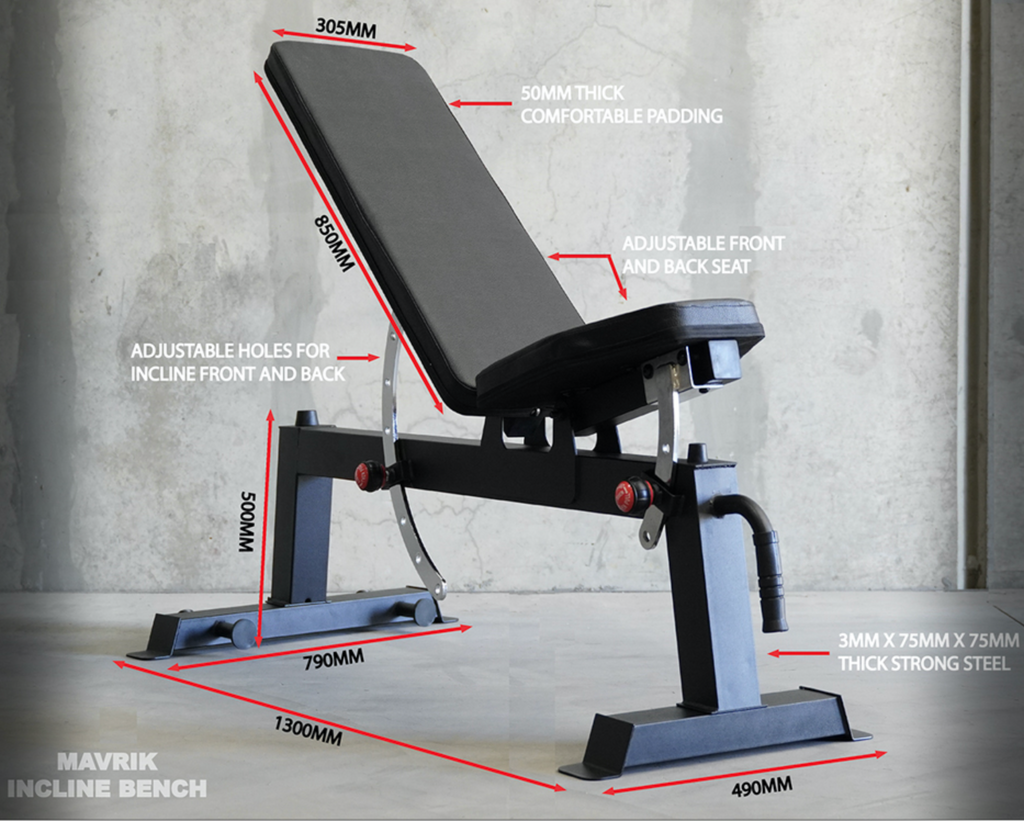
Flat and FID benches are great for exercises that use dumbbells, but if you're looking to perform heavy barbell exercises, specifically bench presses, it's best to move your bench to a power rack for safety. Another option that's probably more convenient is to use an Olympic bench.
Olympic benches are designed to be used with standard 2.2-metre Olympic barbells. They're built very strong to support heavy weights, more than even the strongest exerciser can lift. This makes them big, heavy, and not easy to move. But the good news is, their heavyweight construction means they're hardwearing and long-lasting, with very little that can go wrong with them.
Most Olympic benches have an adjustable racking system so you can set the bar at the right height for your arms' length. This is important because unracking and reracking the bar can be difficult and even dangerous without it.
The uprights on Olympic benches are usually quite wide apart to hold a standard Olympic bar securely. However, this means they may not be suitable for shorter fitness-type barbells. Also, the uprights will get in the way when doing dumbbell exercises.
Olympic benches have built-in plate storage racks, so your workout area stays tidy, and you always have enough weight plates within easy reach. The storage racks are designed specifically for Olympic plates, so smaller fitness weight plates may not fit.
Some commercial-grade Olympic benches have adjustable safety bars that take the weight if you fail to complete a rep or want to do exercises like pin presses or isometrics. They may also have band anchor points for accommodating resistance training.
Olympic benches usually have a fixed angle and are available in flat, incline, and decline variations. This makes them less versatile than FID benches, and they're mainly used for variations of the bench press.
Pros:
- Olympic benches are incredibly strong and stable. You can trust them to support you during even the heaviest lifts.
- They're incredibly easy to use. No complicated assembly is required, just set it up and start pumping iron.
- Built to last, so you can focus on your workouts without any interruptions.
Cons:
- They aren't very versatile. You may need to purchase additional benches to perform different exercises.
- They are only compatible with Olympic barbells and weight plates, so if you have a different type of barbell or weights, this might not be the right choice for you.
- Unfortunately, dumbbell exercises aren't possible with an Olympic bench, so you'll need to have an alternate plan for those workouts.
- Olympic benches tend to be heavy and difficult to move around, so make sure you have a dedicated space for them in your home gym.
- They have a large footprint, so if you're short on space, it might not be the best option for you.
- These types of benches are more expensive than other benches on the market.
4. Speciality benches
Speciality benches are designed to perform a specific function that might not be possible with a regular flat, FID, or Olympic bench. They're not usually very versatile and tend to focus on just one movement or muscle group.
For example:
- Preacher curl or Scott curl benches are perfect for working on your biceps with barbells or dumbbells.
- Adjustable sit-up and crunch benches are great for focusing on your abs.
- 45-degree back extension benches are ideal for lower back, glutes, and hamstring training.
- Captain's chairs are perfect for ab training and vertical benches are great for seated barbell and behind-the-neck presses.
While speciality benches can be incredibly useful and provide comfort and safety during specific exercises, they may not offer a wide range of functionality. This means they could end up taking up valuable space in your home gym that could be better served with a more versatile bench.
But if you've got the space, speciality benches can be a great addition to any gym. They can help you target specific muscles and add variety to your workouts. Just be sure to choose one that will be useful for your fitness goals and won't go unused.
Pros:
- Speciality benches can be a game-changer when it comes to performing certain exercises in comfort and safety. You'll be able to focus on your form and really target specific muscle groups without worrying about injuring yourself.
- They are perfect for training specific areas of your body more effectively. Whether it's your biceps, abs, lower back, or glutes, these benches can help you isolate those muscles and get the most out of your workouts.
Cons:
- Speciality benches are not the most versatile pieces of equipment out there. Most of them only have one function, which means they might not be the best use of your space and money if you're looking for a wider range of exercises.
- They can take up quite a bit of space in your home gym. So if you're short on space, you might want to think twice before adding a speciality bench to your setup.
Read this blog from World Fitness to get more insights and ideas on bench buying.
Features to Consider When Buying a Weight Bench
Maximum Weight Capacity
When you're looking to buy a weight bench, it's important to think about how much weight you'll be lifting. The maximum weight capacity is a key feature you'll want to pay attention to because you want to make sure the bench can handle the amount of weight you'll be using.
After all, there's no point in buying a weight bench that can't support the weight you plan on lifting - it just won't be very useful!
To make sure you're getting a bench that can handle heavier weights, be sure to check the manufacturer's specifications. You'll want to look for benches with higher maximum weight capacities.
That way, you'll have peace of mind knowing that your bench can safely support the amount of weight you plan on using.
Size
Bench size is an essential factor to consider when purchasing a weight bench. Flat benches are typically compact, making them ideal for those with limited space. In contrast, Olympic benches are much larger and are ideal for individuals with more space to work with.
It's crucial to ensure that the bench you select fits the available area in your home gym or workout space. You need to make sure you're also allowing enough space around the bench to ensure safe and unencumbered use.
If you're considering an Olympic or specialty bench, it's also important to consider the length of the barbell. Olympic barbells are typically seven feet long, making them larger and heavier than standard barbells. As a result, these benches require more space and support to accommodate the additional weight.
Range of Exercises and Positions
Choosing the right weight bench can make a big difference in the variety of exercises you can do during your workouts.
When you're shopping for a weight bench, one key feature to consider is how many exercises and positions it can handle. Different types of benches offer different levels of versatility, so you'll want to choose one that meets your needs.
For example, if you go for an adjustable Olympic bench, you'll be able to choose from a wider range of positions than a flat or FID bench. This means you can do more exercises and work different muscle groups.
So, if you're looking to get the most out of your workouts, make sure to choose a weight bench that has multiple positions or is adjustable. This way, you can switch up your routine and target different muscle groups with ease.
Sturdy Design and Construction Materials
One of the most important things to keep in mind is how sturdy and durable it is. You want to make sure you're investing in a bench that can handle the amount of weight you plan on using and won't wobble or become unstable during your workout.
It's always best to opt for a weight bench that's built with high-quality materials like steel or heavy-duty plastic, as they're designed to last long-term. The last thing you want is a flimsy bench that won't be able to keep up with your routine.
So, make sure to give the sturdiness and durability of the weight bench a good look before making your purchase!
Adjustable Seats and Backrests
When looking for a weight bench, it's important to think about how adjustable it is. Adjustable seats and backrests can make a huge difference in the overall comfort of your workouts.
If you're someone who finds yourself constantly shifting around during your lifts, an adjustable weight bench might be the perfect solution to keep you comfortable throughout your routine. Plus, it can save you time and hassle during your workout since you won't have to keep readjusting your position between exercises.
Another great advantage of adjustable weight benches is that they're accommodating for people of different heights. Whether you're tall or short, you can easily adjust the bench to fit your body and get the most out of your workout.
Upholstery, Cushioning, and Padding
Another crucial aspect to keep in mind when choosing a weight bench is the quality of its upholstery, cushioning, and padding. Let's face it, no one wants to be lying on an uncomfortable bench while trying to lift weights.
To ensure maximum comfort, look for weight benches with thick foam padding and durable upholstery that can withstand the wear and tear of frequent use. This will not only make your workouts more comfortable, but it will also help you stay focused on your routine without any distractions.
If you want to know the things to consider before buying a weight bench, then read this blog from Cardio Online to know more!
FAQs About Buying the Right Weight Bench
-
What should I consider when choosing a weight bench?
When choosing a weight bench, consider its sturdiness and durability, adjustability, upholstery, cushioning, and padding. -
What is the best material for a weight bench?
Steel and heavy-duty plastic are great materials for weight benches because they're durable and can withstand a lot of weight. -
Should I get an adjustable weight bench?
If you're someone who likes to switch between different exercises during your workout, or if you find yourself constantly adjusting your position during lifts, then an adjustable weight bench might be a great choice for you. -
What should I look for in terms of cushioning and padding?
When it comes to cushioning and padding, look for a weight bench with thick foam padding and durable upholstery. This will ensure maximum comfort during your workouts. -
What is a good weight capacity for a weight bench?
The weight capacity of a weight bench will vary depending on the model. Look for a weight bench that can handle the amount of weight you plan on using, and then some. -
Can I use a weight bench for other exercises besides lifting weights?
Yes, a weight bench can be used for a variety of exercises, including ab workouts, seated shoulder presses, and more. Just make sure the weight bench you choose is adjustable and can accommodate your needs. -
What is the ideal size for a weight bench?
The ideal size for a weight bench will depend on your personal needs and the available space in your home gym. Consider how much space you have and how much room you need for other equipment before making a final decision.
Choosing the right weight bench is an important decision for anyone looking to set up a home gym or outfit a commercial fitness facility. With so many different options available, it can be overwhelming to know where to start.
However, by considering factors like the type of exercise you want to do, the size of the bench, the weight capacity, and the overall quality and durability, you can make an informed decision that will help you achieve your fitness goals.
Whether you're a fitness enthusiast setting up a home gym or a gym owner outfitting a commercial facility, choosing the right weight bench is crucial. Your clients will depend on having reliable and high-quality equipment to get the most out of their workouts.
By using this guide, you now have the tools and knowledge to make an informed decision and choose the right weight bench for your fitness needs. Also, visit our website to see our available gym equipment.
If you have any questions about the best weight bench for your home gym, our friendly team at VERVE Fitness would be more than happy to help -
Phone: 1300 1947 48
Email: team@vervefitness.com.au
If you're looking to fit out your commercial gym, get in contact with our team today. VERVE is your complete solution to achieving a premium branded look throughout your gym.
For other guides, you can also read the Comprehensive Buyers Guide for Weight Benches - Gym Plus blog.
Are you familiar with weight benches? These versatile exercise equipment pieces are designed to offer a stable platform for strength training exercises, making them an excellent addition to your workout routine.
What's great about weight benches is their compatibility with various workout equipment, such as free weights like barbells and dumbbells, as well as machines, allowing you to diversify your training regime. You can also customise the height and angle of the bench to fit various body types and exercise routines, making it suitable for both beginners and advanced lifters.
By incorporating a weight bench into your exercise routine, you can increase your strength training potential and work towards achieving your fitness goals.
A good weight bench can make your workout much more effective and enjoyable. In contrast, the wrong bench could make your workout uncomfortable, frustrating, and even dangerous.
With so many different types of benches to choose from, it can be a hard task to decide which one is right for you. This guide will help you choose the right weight bench for your needs.
Benefits of Using Weight Bench
Weight benches are a fantastic addition to any strength training regimen, and here's why.
- Targeted Workouts: You can perform highly effective exercises that target specific muscle groups in a way that other equipment simply cannot match. Not only that, but you can customise the angle of your body to better target your desired muscle group, giving you greater control over your workout.
- Increased Safety: Weight benches provide excellent stability and reduce the risk of injury during exercise. They create a stable platform that evenly distributes pressure and force throughout your body, protecting your joints from unnecessary strain. This feature is especially beneficial for those with pre-existing injuries or joint pain.
- Versatility: Weight benches are also ideal for other exercises, such as sit-ups and crunches, or any abdominal workout that requires support for your back and shoulders.
If you're considering purchasing a weight bench, we highly recommend reading through this informative blog, as it offers valuable insights into buying the right bench for your specific needs.
Types of Weight Benches
When it comes to weight benches, there are numerous options to choose from, and selecting the right one can be daunting, but don't worry - we're here to assist.
Broadly speaking, there are four types of weight benches, each one offering advantages and disadvantages.
- Flat benches
- Adjustable (FID) benches
- Olympic benches
- Speciality benches
So, what makes them different from one another?
1. Flat benches

Flat benches are great for providing a solid platform for all sorts of barbell and dumbbell exercises, as well as bodyweight exercises like bench dips or rear-foot elevated split squats.
Because they're not adjustable, they tend to be super strong and can support a lot of weight - which makes them ideal for commercial settings. Their simple but solid construction means that there is very little that can go wrong with a flat bench, so they should be hardwearing and long-lasting. Plus, they're usually cheaper than other types of benches, so gyms tend to have a few of them lying around.
One downside to using a flat bench is that you can't adjust the exercise angles. So, for example, you can only do horizontal dumbbell presses and flys. And if you're doing exercises like biceps curls or shoulder presses, you'll have to do them without the luxury of back support.
But overall, flat benches are hardwearing, long-lasting, and easy to move around - so they're a great choice for smaller spaces or multi-purpose areas.
Pros:
- Flat benches are really strong and stable, which makes them great for heavy lifting.
- They're also really easy to move around - perfect for when you need to switch up your workout space.
- Flat benches can be used in a ton of different ways - you can stick 'em in a Smith machine, power rack, or cable machine to mix things up.
- They're super hardwearing and long-lasting, which is great if you're looking for a bench that'll go the distance.
- Flat benches are pretty versatile - you can use them for all sorts of exercises.
- They're usually quite compact, which makes them a great option for small spaces.
- They're usually cheaper than other types of benches, which is always a plus.
Cons:
- The downside to flat benches is that they're not adjustable, so they're really only suitable for supine exercises.
- For safety reasons, most barbell exercises should be done in conjunction with a power rack.
- If you're doing seated exercises, there's no back support - so you'll need to be careful and make sure you're using proper form.
2. Adjustable (FID) benches

Adjustable benches are sometimes called FID benches because they can be set to flat, incline, or decline positions. This is great because you can target different muscles from different angles.
You can set the bench to a slight incline for a different kind of bench press, or to a steep incline for shoulder presses. With an adjustable bench, you can also do chest-supported rows and reverse flyes.
Unlike flat benches, adjustable benches have moving parts that can wear out over time. That said, good quality FID benches should last a long time with proper care.
It's a good idea to check them regularly for any signs of wear and tear, especially with more frequent use. One thing to keep in mind is that adjustable benches are not as strong as fixed flat benches, and they tend to be heavier and larger too.
However, to make them easier to move around, many adjustable benches come with wheels so you can roll them around to different spots in your home or commercial gym.
It's also worth noting that not all adjustable benches offer a decline setting, and those that do usually only provide a slight decline. So, if you want to do decline exercises, you might need to look for a specialised decline bench.
Finally, adjustable benches with more moving parts may wobble a little, but good quality ones should wobble much less than lightweight home-use benches. Just make sure the incline locking mechanism is in good working order and locks the back support securely in place before you start lifting weights.
Pros:
- With an adjustable bench, you can enjoy greater exercise variety as you can change the angle of the backrest to work your muscles from different angles.
- These benches are suitable for both home and commercial use, providing versatility for different environments.
Cons:
- Adjustable benches are not as easy to move as flat benches due to their size and weight.
- They are also not as strong as flat benches, so they may not be suitable for heavy lifting.
- With more moving parts, adjustable benches are more prone to wear and tear and may require more maintenance.
- Usually, they are more expensive than flat benches, so they may not be the best choice for those on a tight budget.
The blog from Chili Guides answered the question "What To Look For" in Adjustable Bench vs. Fixed Bench. Read this and get more insights on deciding what to choose.
3. Olympic benches

Flat and FID benches are great for exercises that use dumbbells, but if you're looking to perform heavy barbell exercises, specifically bench presses, it's best to move your bench to a power rack for safety. Another option that's probably more convenient is to use an Olympic bench.
Olympic benches are designed to be used with standard 2.2-metre Olympic barbells. They're built very strong to support heavy weights, more than even the strongest exerciser can lift. This makes them big, heavy, and not easy to move. But the good news is, their heavyweight construction means they're hardwearing and long-lasting, with very little that can go wrong with them.
Most Olympic benches have an adjustable racking system so you can set the bar at the right height for your arms' length. This is important because unracking and reracking the bar can be difficult and even dangerous without it.
The uprights on Olympic benches are usually quite wide apart to hold a standard Olympic bar securely. However, this means they may not be suitable for shorter fitness-type barbells. Also, the uprights will get in the way when doing dumbbell exercises.
Olympic benches have built-in plate storage racks, so your workout area stays tidy, and you always have enough weight plates within easy reach. The storage racks are designed specifically for Olympic plates, so smaller fitness weight plates may not fit.
Some commercial-grade Olympic benches have adjustable safety bars that take the weight if you fail to complete a rep or want to do exercises like pin presses or isometrics. They may also have band anchor points for accommodating resistance training.
Olympic benches usually have a fixed angle and are available in flat, incline, and decline variations. This makes them less versatile than FID benches, and they're mainly used for variations of the bench press.
Pros:
- Olympic benches are incredibly strong and stable. You can trust them to support you during even the heaviest lifts.
- They're incredibly easy to use. No complicated assembly is required, just set it up and start pumping iron.
- Built to last, so you can focus on your workouts without any interruptions.
Cons:
- They aren't very versatile. You may need to purchase additional benches to perform different exercises.
- They are only compatible with Olympic barbells and weight plates, so if you have a different type of barbell or weights, this might not be the right choice for you.
- Unfortunately, dumbbell exercises aren't possible with an Olympic bench, so you'll need to have an alternate plan for those workouts.
- Olympic benches tend to be heavy and difficult to move around, so make sure you have a dedicated space for them in your home gym.
- They have a large footprint, so if you're short on space, it might not be the best option for you.
- These types of benches are more expensive than other benches on the market.
4. Speciality benches
Speciality benches are designed to perform a specific function that might not be possible with a regular flat, FID, or Olympic bench. They're not usually very versatile and tend to focus on just one movement or muscle group.
For example:
- Preacher curl or Scott curl benches are perfect for working on your biceps with barbells or dumbbells.
- Adjustable sit-up and crunch benches are great for focusing on your abs.
- 45-degree back extension benches are ideal for lower back, glutes, and hamstring training.
- Captain's chairs are perfect for ab training and vertical benches are great for seated barbell and behind-the-neck presses.
While speciality benches can be incredibly useful and provide comfort and safety during specific exercises, they may not offer a wide range of functionality. This means they could end up taking up valuable space in your home gym that could be better served with a more versatile bench.
But if you've got the space, speciality benches can be a great addition to any gym. They can help you target specific muscles and add variety to your workouts. Just be sure to choose one that will be useful for your fitness goals and won't go unused.
Pros:
- Speciality benches can be a game-changer when it comes to performing certain exercises in comfort and safety. You'll be able to focus on your form and really target specific muscle groups without worrying about injuring yourself.
- They are perfect for training specific areas of your body more effectively. Whether it's your biceps, abs, lower back, or glutes, these benches can help you isolate those muscles and get the most out of your workouts.
Cons:
- Speciality benches are not the most versatile pieces of equipment out there. Most of them only have one function, which means they might not be the best use of your space and money if you're looking for a wider range of exercises.
- They can take up quite a bit of space in your home gym. So if you're short on space, you might want to think twice before adding a speciality bench to your setup.
Read this blog from World Fitness to get more insights and ideas on bench buying.
Features to Consider When Buying a Weight Bench
Maximum Weight Capacity
When you're looking to buy a weight bench, it's important to think about how much weight you'll be lifting. The maximum weight capacity is a key feature you'll want to pay attention to because you want to make sure the bench can handle the amount of weight you'll be using.
After all, there's no point in buying a weight bench that can't support the weight you plan on lifting - it just won't be very useful!
To make sure you're getting a bench that can handle heavier weights, be sure to check the manufacturer's specifications. You'll want to look for benches with higher maximum weight capacities.
That way, you'll have peace of mind knowing that your bench can safely support the amount of weight you plan on using.
Size
Bench size is an essential factor to consider when purchasing a weight bench. Flat benches are typically compact, making them ideal for those with limited space. In contrast, Olympic benches are much larger and are ideal for individuals with more space to work with.
It's crucial to ensure that the bench you select fits the available area in your home gym or workout space. You need to make sure you're also allowing enough space around the bench to ensure safe and unencumbered use.
If you're considering an Olympic or specialty bench, it's also important to consider the length of the barbell. Olympic barbells are typically seven feet long, making them larger and heavier than standard barbells. As a result, these benches require more space and support to accommodate the additional weight.
Range of Exercises and Positions
Choosing the right weight bench can make a big difference in the variety of exercises you can do during your workouts.
When you're shopping for a weight bench, one key feature to consider is how many exercises and positions it can handle. Different types of benches offer different levels of versatility, so you'll want to choose one that meets your needs.
For example, if you go for an adjustable Olympic bench, you'll be able to choose from a wider range of positions than a flat or FID bench. This means you can do more exercises and work different muscle groups.
So, if you're looking to get the most out of your workouts, make sure to choose a weight bench that has multiple positions or is adjustable. This way, you can switch up your routine and target different muscle groups with ease.
Sturdy Design and Construction Materials
One of the most important things to keep in mind is how sturdy and durable it is. You want to make sure you're investing in a bench that can handle the amount of weight you plan on using and won't wobble or become unstable during your workout.
It's always best to opt for a weight bench that's built with high-quality materials like steel or heavy-duty plastic, as they're designed to last long-term. The last thing you want is a flimsy bench that won't be able to keep up with your routine.
So, make sure to give the sturdiness and durability of the weight bench a good look before making your purchase!
Adjustable Seats and Backrests
When looking for a weight bench, it's important to think about how adjustable it is. Adjustable seats and backrests can make a huge difference in the overall comfort of your workouts.
If you're someone who finds yourself constantly shifting around during your lifts, an adjustable weight bench might be the perfect solution to keep you comfortable throughout your routine. Plus, it can save you time and hassle during your workout since you won't have to keep readjusting your position between exercises.
Another great advantage of adjustable weight benches is that they're accommodating for people of different heights. Whether you're tall or short, you can easily adjust the bench to fit your body and get the most out of your workout.
Upholstery, Cushioning, and Padding
Another crucial aspect to keep in mind when choosing a weight bench is the quality of its upholstery, cushioning, and padding. Let's face it, no one wants to be lying on an uncomfortable bench while trying to lift weights.
To ensure maximum comfort, look for weight benches with thick foam padding and durable upholstery that can withstand the wear and tear of frequent use. This will not only make your workouts more comfortable, but it will also help you stay focused on your routine without any distractions.
If you want to know the things to consider before buying a weight bench, then read this blog from Cardio Online to know more!
FAQs About Buying the Right Weight Bench
-
What should I consider when choosing a weight bench?
When choosing a weight bench, consider its sturdiness and durability, adjustability, upholstery, cushioning, and padding. -
What is the best material for a weight bench?
Steel and heavy-duty plastic are great materials for weight benches because they're durable and can withstand a lot of weight. -
Should I get an adjustable weight bench?
If you're someone who likes to switch between different exercises during your workout, or if you find yourself constantly adjusting your position during lifts, then an adjustable weight bench might be a great choice for you. -
What should I look for in terms of cushioning and padding?
When it comes to cushioning and padding, look for a weight bench with thick foam padding and durable upholstery. This will ensure maximum comfort during your workouts. -
What is a good weight capacity for a weight bench?
The weight capacity of a weight bench will vary depending on the model. Look for a weight bench that can handle the amount of weight you plan on using, and then some. -
Can I use a weight bench for other exercises besides lifting weights?
Yes, a weight bench can be used for a variety of exercises, including ab workouts, seated shoulder presses, and more. Just make sure the weight bench you choose is adjustable and can accommodate your needs. -
What is the ideal size for a weight bench?
The ideal size for a weight bench will depend on your personal needs and the available space in your home gym. Consider how much space you have and how much room you need for other equipment before making a final decision.
Choosing the right weight bench is an important decision for anyone looking to set up a home gym or outfit a commercial fitness facility. With so many different options available, it can be overwhelming to know where to start.
However, by considering factors like the type of exercise you want to do, the size of the bench, the weight capacity, and the overall quality and durability, you can make an informed decision that will help you achieve your fitness goals.
Whether you're a fitness enthusiast setting up a home gym or a gym owner outfitting a commercial facility, choosing the right weight bench is crucial. Your clients will depend on having reliable and high-quality equipment to get the most out of their workouts.
By using this guide, you now have the tools and knowledge to make an informed decision and choose the right weight bench for your fitness needs. Also, visit our website to see our available gym equipment.
If you have any questions about the best weight bench for your home gym, our friendly team at VERVE Fitness would be more than happy to help -
Phone: 1300 1947 48
Email: team@vervefitness.com.au
If you're looking to fit out your commercial gym, get in contact with our team today. VERVE is your complete solution to achieving a premium branded look throughout your gym.
For other guides, you can also read the Comprehensive Buyers Guide for Weight Benches - Gym Plus blog.
